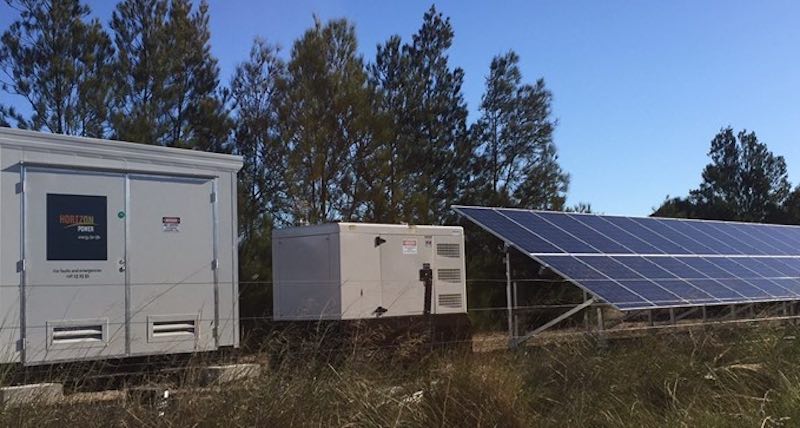

Western Australia’s government-owned utility Horizon Power is getting to work on a major grid transformation that is bound to be the envy of network companies all across this wide brown land: replacing 54km of ageing power lines with stand-alone solar and battery systems.
The WA McGowan government said on Tuesday that site works to prepare for the installation of 13 Micro Power Systems across 14 rural properties (one of those systems will service two properties) in the state’s south were set to begin in April.
The stand-alone MPS will use a combination of solar and battery technology, with back-up diesel generation, to provide power for farmers living on the edge of the grid in the Esperance and Condingup regions.
The powerlines that had serviced those properties – more than 50 km of them – will then be decommissioned.
For Horizon, this means avoiding the ongoing and steep cost of upgrade and maintenance to those power lines, which weave through remote bushland, and operate at the mercy of the ever-harsher and less predictable elements.
For customers, it means a firmed supply of mostly solar power for the same cost as for electricity from the overhead network, minus the frequent outages.

If that sounds like an all-round no-brainer, that’s because it is. Particularly in a country like Australia, with long and stringy grids built to deliver centrally generated electricity.
However, in most states – despite the huge cross subsidy paid by city users for regional customers, regulations don’t allow for networks to do the obvious thing and replace lengthy and expensive power lines with stand alone solar and battery systems.
There is hope that that will change, but for the moment, Western Australia is leading the way to a new normal.
The state’s other government-owned utility, Western Power, is doing a similar thing, but on a much larger scale – fitting 57 regional properties with stand alone solar and battery storage.
A statement from W.A. energy minister Bill Johnston last month said the cost of servicing the 57 SPS (stand-alone power system) units for their entire working life would save Western Power almost $6 million, compared to traditional network refurbishment.
No such estimates of cost saving have been made for the Horizon project, but the utility’s general manager of consumer energy, Mark Paterson, says the Micro Power Systems represent a brilliant power solution for remote properties at the less reliable end of the grid.
“Traditional electricity lines that run more than 50 kilometres through remote bushland face all kinds of hazards like falling trees, lightning strikes, high winds and incidents with farm machinery,” he said.
“As a result, these customers who are east of Esperance and the Condingup area, can have frequent and prolonged power outages that may take considerable time to restore”.
“Experience has shown us that customers love the MPS solution as it provides them with safe, reliable power, day after day.”
Indeed, Horizon has been installing stand-alone solar and battery storage-based systems since mid-2016, when it did so for customers affected by the 2015 Esperance bushfires, which destroyed more than 320 power poles and hundreds of kilometres of power lines in the region.
At the time, Horizon managing director Frank Tudor said that a more innovative approach to power supply made better sense than poles and wires for some of the more susceptible parts of the network.
“Horizon Power is now actively looking to remove ageing poles and wires where this will provide a more efficient and cost-effective grid for all our customers,” said Paterson in comments in May.
In 2017, Horizon used an MPS to take the Fitzgerald River National Park off grid, using 10kW of solar, 25kWh of lithium-ion battery storage and 15 kVA of back-up diesel generation.
That project alone allowed for the decommissioning of 21 power poles and 4km of power lines, some of which crossed over the Culham Inlet at the Park, making it both unsightly and difficult to service.
For the coming round of installs around Esperance and Condingup, Horizon has appointed Perth company, CPS National, to deliver and install the systems, which it says will be fully operational by the end of the year.
In a statement on Tuesday, minister Johnston said the government was committed to transitioning to renewable energy technologies at the lowest cost possible to taxpayers.
“The MPS will provide the farmers with more reliable and safe power that will cost the state less to provide.”

Sophie is editor of One Step Off The Grid and deputy editor of its sister site, Renew Economy. Sophie has been writing about clean energy for more than a decade.



